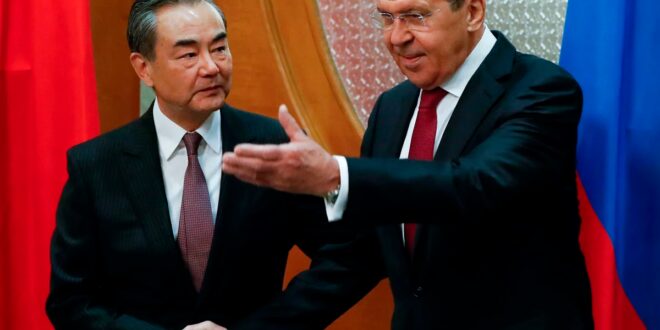China’s foreign minister, Wang Yi, held a phone call with Russian foreign minister Sergey Lavrov on Thursday after Russian troops invaded Ukraine and began airstrikes on numerous Ukrainian cities.
The call is part of a delicate geopolitical balancing act on China’s part. Beijing has been careful not to explicitly endorse nor condemn the Russian invasion of Ukraine.
According to a readout from China’s foreign ministry, Lavrov told Wang the invasion was precipitated by the inability of the U.S. and NATO to uphold commitments made under a complicated truce agreement called the Minsk Protocol.
Wang responded ambiguously. “China respects each country’s sovereignty and territorial integrity,” he said. “At the same time, we also see the Ukraine problem has a complex and particular historical state of affairs and we understand Russia’s reasonable concern on security issues.”
But Wang also stressed that China wanted “dialogue and negotiation,” rather than military means, to solve tensions. “China’s position is to thoroughly cast aside a Cold War mentality,” he said.
China has edged closer to Russia as both countries try to counter American influence globally. Earlier this month, presidents from both countries released a lengthy joint statement with Russia, pledging solidarity ideologically.
Russia’s Vladimir Putin was also one of the few world leaders to attend the Winter Olympics opening ceremony in Beijing.
The partnership has allowed China to hit back against perceived American interference.
This week, after Ned Price, a spokesperson for the U.S. State Department of State, asked that China urge Russia to respect Ukraine’s sovereignty and territorial integrity, China responded angrily.
“The U.S. has no right to instruct China what to do in terms of respecting sovereignty and territorial integrity,” said Hua Chunying, a Chinese ministry spokesperson “Just some 20 years ago, the Chinese embassy in the Yugoslavia was bombed by NATO. Today, we still face the real threat of the U.S. and its so-called ‘allies’ interfering in China’s internal affairs.”
But China has also been careful not to endorse Russia’s military invasion of Ukraine. It wants to avoid being drawn into a rapidly escalating conflict in Ukraine and attracting some of the global condemnation already being levied against Russia.
On Thursday, China’s foreign ministry urged all parties to “maintain restraint” on Ukraine and once again encouraged Russia to return to the negotiation table, rather than take to the battlefield.
“The sovereignty, independence and territorial integrity of any countries should be respected and safeguarded because this is a basic norm of international relations,” said China’s Wang said last week at the Munich Security Conference. “Ukraine is no exception.”
 Eurasia Press & News
Eurasia Press & News



